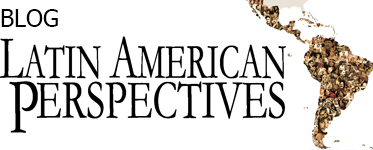Climate Change, Neoliberalism, and Migration: Mexican Sons of Peasants on the Beach
by Tamar Diana Wilson | November 10, 2020 Climate change and neoliberal policies in Mexico have been fomenting migration by campesinos and their sons. This migration is primarily internal, to cities and tourist centers, where migrants engage in informal and semi-informal income-generating activities. Interviews with 32 beach vendors, sons of campesinos, in Cabo San Lucas reflect these two drivers of migration: while most reported that they would like to farm, they identified drought and lack of government aid as major difficulties for farmers in their hometowns. CONTINUE READING FULL ARTICLE HERE CONTINUE READING HERE > > > Posted by Latin American Perspectives at 1:54 PM No comments:


